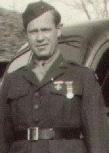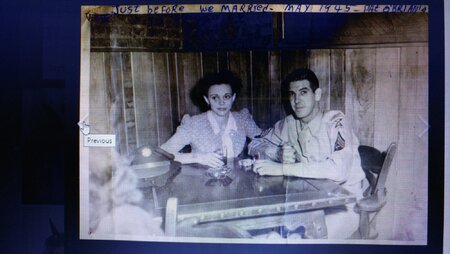purvis_guy
Victim of Laughing Chance
Offline
This thread is in response to Joe OKC's request. Unfortunately I don't have a lot of stories because my father, like a lot of vets did not talk much about his experiences in WW II in the south pacific. He was in the Army, tried to join the Marines after Pearl Harbor but was rejected because he was a boxer in New Orleans before the war and had slight hearing damage and missing teeth. My dad had three photo albums of war pictures but two were damaged when our water heater sprung a leak and got them wet, my mom threw them away instead of trying to save them. I still have one and treasure it. My dad died in 1989, I wish I had picked his brain more of his time in the war.
He was on most of the islands at one time or the other, the Phillipines, Guadalcanal, Iwo Jima, Bouganville and others. At one time he was tasked with helping to clear out snipers on the islands after the Marines took the island but came down with a particularly bad case yellow fever and malaria and was then made a cook because, well, he was a coonass from south Louisiana who had worked in a restaurant before the war, lol.
My mother told me of how my dad would sleep with a loaded Colt 1911 under his pillow for the longest time after he got home in 1945. They didn't have alot of help for vets back then so they were pretty much left to their own to deal with what they call PTSD today. My mom was there for him at that time. She told me of a time when they had moved back to her home near Purvis, MS and were in a movie theater in Hattiesburg when my dad tensed up and said there was a "jap" near them , sure enough when she turned and looked a Japanese-American family were sitting behind them. He said he smelled them, he learned in the war that the smell was a combination of sweat and Sake. He actually became good friends with them and the son worked for him for a time, their name was Sasaki.
I often used to look at the pictures in those photo albums and marvel at these kids, barely in their teens and twenties who were sent to Europe and the South Pacific and told to save the world. And that is why they are called the "greatest generation" because they did just that.
***Feel free to add any stories of your friends and family who have stories to tell to of any conflict they were in from WW II to the middle east.
He was on most of the islands at one time or the other, the Phillipines, Guadalcanal, Iwo Jima, Bouganville and others. At one time he was tasked with helping to clear out snipers on the islands after the Marines took the island but came down with a particularly bad case yellow fever and malaria and was then made a cook because, well, he was a coonass from south Louisiana who had worked in a restaurant before the war, lol.
My mother told me of how my dad would sleep with a loaded Colt 1911 under his pillow for the longest time after he got home in 1945. They didn't have alot of help for vets back then so they were pretty much left to their own to deal with what they call PTSD today. My mom was there for him at that time. She told me of a time when they had moved back to her home near Purvis, MS and were in a movie theater in Hattiesburg when my dad tensed up and said there was a "jap" near them , sure enough when she turned and looked a Japanese-American family were sitting behind them. He said he smelled them, he learned in the war that the smell was a combination of sweat and Sake. He actually became good friends with them and the son worked for him for a time, their name was Sasaki.
I often used to look at the pictures in those photo albums and marvel at these kids, barely in their teens and twenties who were sent to Europe and the South Pacific and told to save the world. And that is why they are called the "greatest generation" because they did just that.
***Feel free to add any stories of your friends and family who have stories to tell to of any conflict they were in from WW II to the middle east.




